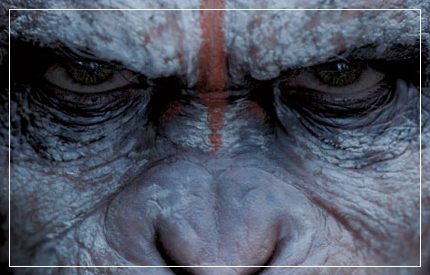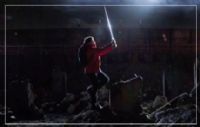Dawn Of The Planet Of The Apes
Date: 16/07/2014
Movie Review

Every great journey, and indeed every great movie franchise, begins with a single step. In Rise Of The Planet Of The Apes the premise for what would follow was set out beautifully.
Small steps rather than loud, pounding, all sound and fury ones. Apes would gain accelerated intelligence through being guinea pigs for a drug that would repair brain cells and help combat Alzheimer's. It had a plausibility, particularly on an emotional level with main character James Franco forming a paternal bond with an ape called Caesar, named by his father, who is suffering from Alzheimer's.
You probably know the rest, otherwise you wouldn't be reading a review about the sequel. And it set up the sequel well. Caesar frees the other laboratory apes and gives them the gift of the virus that would act as the Monolith did in 2001: A Space Odyssey. The next evolutionary step for our closest genetic relative.
Dawn is set 10 years hence. All but 1 in 500 of the earth's human population (including all lead characters from Rise, ballsy to say the least) have been killed by a virus made in the same lab that created the experimental Alzheimer's drug.
In San Francisco, a small colony of surviving humans are living in a corner of the city, eking out a life under threat of a rapidly decreasing power source and paranoia about their simian neighbours.
Across the Golden Gate Bridge, in the woods, Caesar and the rest are thriving very nicely. Ever growing, with a basic vocabulary and a fairly sophisticated sign language. Caesar, being their liberator, is regarded as their leader. An uneasy peace remains between human and ape. Until the humans, needing a power source for the blinking city, enter the woods to try and access the dam and use it as a generator.
In spite of an initial violent encounter, Caesar, out of a love and loyalty to his human family, reaches out the olive branch and a saving hand to the humans.
Of course, as these things go, it doesn't quite work out as planned. Malevolent and Machiavellian figures on both sides do their best to sabotage the plan; out of fear, ignorance and a desire for power.
A Shakespearian premise; apt given the source of Caesar's christening in Rise. Director Matt Reeves, whose previous work includes Cloverfield and Let Me In, reveals throughout why he is indeed perfect for the job.
The atmospheres of Let Me In, the subtle terror and urgent cinematography of Cloverfield are evident here. For a film so reliant on CGI and (urgh) 3D, he handles both so subtly and deftly, that one almost forgets the apes are actually computer generated. Their interactions at times more convincing than their 'real' co-stars. But it isn't so subtle that he compromises on drama.
There are some stunning set pieces, particularly a scene involving a bear fight and a POV shot on a gun turret. But it is the emotional centre of the film that carries it.
The desire to co-exist, avoid conflict and thrive. As 'right on' as it may be but hey, even the star of the 1968 Planet Of The Apes was a hippy once. In the space of 5 years from the original Apes, Charlton Heston also made the truly brilliant the Omega Man and Soylent Green, all three films a warning of how the human race was going to mess up the third rock from the sun.
Maybe that's why the original Apes franchise has remained in popular culture so constantly, even if the films/TV series got more and more ridiculous, and indeed decreased in quality exponentially. Like a simian Police Academy if you will.Ă‚Â
Dawn also continues the theme of the original 1968 film. A central message that expresses regret at man's greed and violence, a desire for a simpler existence and an understanding bore out by Caesar's statement: "We are more like them than we think."
This is proving to be an exciting franchise, barely putting a foot wrong, and attempting to actually say something whilst proving enormously entertaining.
By Joe Lindsay
Small steps rather than loud, pounding, all sound and fury ones. Apes would gain accelerated intelligence through being guinea pigs for a drug that would repair brain cells and help combat Alzheimer's. It had a plausibility, particularly on an emotional level with main character James Franco forming a paternal bond with an ape called Caesar, named by his father, who is suffering from Alzheimer's.
You probably know the rest, otherwise you wouldn't be reading a review about the sequel. And it set up the sequel well. Caesar frees the other laboratory apes and gives them the gift of the virus that would act as the Monolith did in 2001: A Space Odyssey. The next evolutionary step for our closest genetic relative.
Dawn is set 10 years hence. All but 1 in 500 of the earth's human population (including all lead characters from Rise, ballsy to say the least) have been killed by a virus made in the same lab that created the experimental Alzheimer's drug.
In San Francisco, a small colony of surviving humans are living in a corner of the city, eking out a life under threat of a rapidly decreasing power source and paranoia about their simian neighbours.
Across the Golden Gate Bridge, in the woods, Caesar and the rest are thriving very nicely. Ever growing, with a basic vocabulary and a fairly sophisticated sign language. Caesar, being their liberator, is regarded as their leader. An uneasy peace remains between human and ape. Until the humans, needing a power source for the blinking city, enter the woods to try and access the dam and use it as a generator.
In spite of an initial violent encounter, Caesar, out of a love and loyalty to his human family, reaches out the olive branch and a saving hand to the humans.
Of course, as these things go, it doesn't quite work out as planned. Malevolent and Machiavellian figures on both sides do their best to sabotage the plan; out of fear, ignorance and a desire for power.
A Shakespearian premise; apt given the source of Caesar's christening in Rise. Director Matt Reeves, whose previous work includes Cloverfield and Let Me In, reveals throughout why he is indeed perfect for the job.
The atmospheres of Let Me In, the subtle terror and urgent cinematography of Cloverfield are evident here. For a film so reliant on CGI and (urgh) 3D, he handles both so subtly and deftly, that one almost forgets the apes are actually computer generated. Their interactions at times more convincing than their 'real' co-stars. But it isn't so subtle that he compromises on drama.
There are some stunning set pieces, particularly a scene involving a bear fight and a POV shot on a gun turret. But it is the emotional centre of the film that carries it.
The desire to co-exist, avoid conflict and thrive. As 'right on' as it may be but hey, even the star of the 1968 Planet Of The Apes was a hippy once. In the space of 5 years from the original Apes, Charlton Heston also made the truly brilliant the Omega Man and Soylent Green, all three films a warning of how the human race was going to mess up the third rock from the sun.
Maybe that's why the original Apes franchise has remained in popular culture so constantly, even if the films/TV series got more and more ridiculous, and indeed decreased in quality exponentially. Like a simian Police Academy if you will.Ă‚Â
Dawn also continues the theme of the original 1968 film. A central message that expresses regret at man's greed and violence, a desire for a simpler existence and an understanding bore out by Caesar's statement: "We are more like them than we think."
This is proving to be an exciting franchise, barely putting a foot wrong, and attempting to actually say something whilst proving enormously entertaining.
By Joe Lindsay
More info : http://www.moviehouse.co.uk/




































